Tamilnadu State Board New Syllabus Samacheer Kalvi 4th Science Guide Pdf Term 2 Water 1 Food Text Book Back Questions and Answers, Notes.
Tamilnadu Samacheer Kalvi 4th Science Solutions Term 2 Chapter 2 Water
Samacheer Kalvi 4th Science Guide Water Text Book Back Questions and Answers
![]()
I. Choose the correct answer :
Question 1.
Water is the most _____________ resource on the Earth.
(a) Precious
(b) Solid
(c) Gas
Answer:
(a) Precious
Question 2.
Water exists in _____________ states.
(a) Two
(b) Three
(c) Four
Answer:
(b) Three
Question 3.
At temperature below ____________ water freezes to form ice.
(a) 10°C
(b) 100°C
(c) 0° C
Answer:
(c) 0°C
Question 4.
___________ is the process by which water becomes water vapour.
(a) Condensation
(b) Evaporation
(c) Freezing
Answer:
(b) Evaporation
Question 5.
Which controls the ecological functions of life?
(a) Bicycle
(b) Water cycle
(c) Recycle water
Answer:
(b) Water cycle
![]()
II. Fill in the blanks with suitable answer :
Question 1.
Water is converted into ____________ when it is heated. (ice cube/water vapour).
Answer:
water vapour
Question 2.
Water becomes ice on ____________. (heating/freezing).
Answer:
Freezing
Question 3.
Water droplets combine to form _____________. (rain/clouds).
Answer:
Clouds
Question 4.
Water cycle increases the availability of ______________. (water tank/ground water).
Answer:
Ground water
Question 5.
___________ is a type of rainwater harvesting. (Roof top harvesting/Watercycle).
Answer:
Roof top harvesting
![]()
III. Write True or False :
Question 1.
Water is a good example for all states of matter.
Answer:
True
Question 2.
Water cycle controls Earth’s temperature.
Answer:
True
Question 3.
Water becoming water vapour on heating is called evaporation.
Answer:
True
Question 4.
37% of our brain’s mass consists of water.
Answer:
False
Question 5.
Roof top harvesting method is used in agriculture field.
Answer:
False
![]()
IV. Answer briefly :
Question 1.
Write the states of water.
Answer:
Water occurs naturally in three forms: ice, water and water vapour. These forms are also called states of water. Ice is in solid form, water is in liquid form and water vapour is in gaseous form.
Question 2.
What is freezing?
Answer:
Ice is a solid form of water. At temperature below 0° C water becomes ice. This process is called freezing.

Question 3.
Name the processes involved in water cycle.
Answer:
Evaporation, Condensation, Precipitation.
Question 4.
Which state government made rain water harvesting as mandatory in the year 2001?
Answer:
Tamil Nadu is the first Indian state which made rainwater harvesting as mandatory in 2001.
Question 5.
What is needed to construct a rain water harvesting pit?
Answer:
Boulders, gravels and Coarse sand are needed to construct a rain water harvesting pit.
![]()
V. Answer in detail :
Question 1.
What is water cycle? Write any three importances of water cycle.
Answer:
The continuous cycle through which water is circulated by different processes like evaporation, condensation and precipitation is called water cycle.
Importances of water cycle :
- To improve the availability of ground water.
- To control the Earth’s temperature.
- To provide water to plants and animals especially humans.
- To recycle the Earth’s supply of water constantly.
Question 2.
What is rain water harvesting? List out the advantages of rain water harvesting.
Answer:
‘Rainwater harvesting’ is the process of collecting and storing rainwater for future use. Rainwater can be collected in natural reservoirs or artificial tanks. Roof top harvesting is also a type of rainwater harvesting. The rainwater on the top of the building is collected and passed into the ground through pipes.
Water passing thrcugh the pipes enters the pit which consist of gravels and Coarse sand. As it passes impurities are filtered and stored as ground water.
Advantages of rain water harvesting:
- It increases the ground water level
- It can be used for agriculture
- It increases the availability of water for living things.
![]()
V. Colour the given picture and write the correct name in the given blanks :
Question 1.
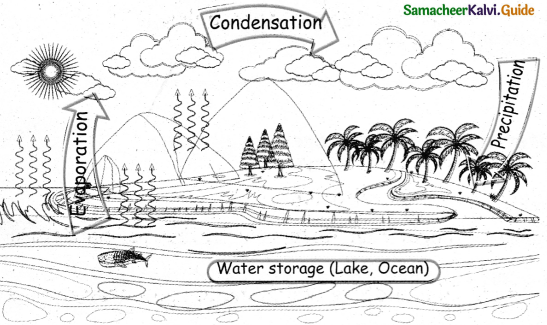
Answer:
Activity to be done by the students themselves
![]()
Samacheer Kalvi 4th Science Guide Water InText Questions and Answers
Let us do (Text Book page No. 69)
Question 1.
See the given pictures and write down the state of each objects.(Solid, Liquid, Gas)
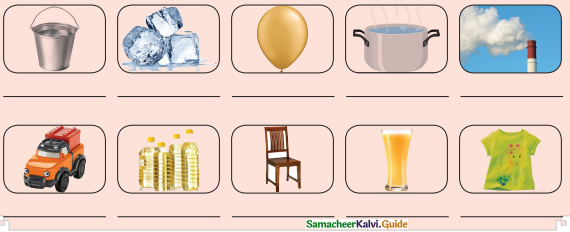
Answer:
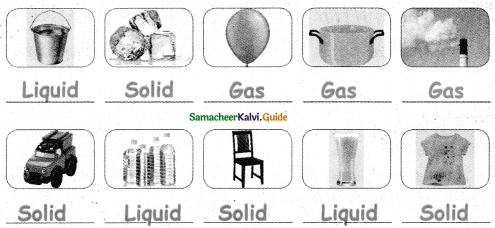
![]()
Let us do (Text Book page No. 70)
Question 1.
Fill in the boxes given below with correct answers.
(Liquid, Solid, Melting, Freezing, Cooling, Heating, Gas)
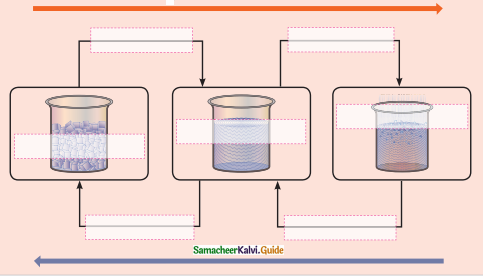
Answer:
Change of states in water
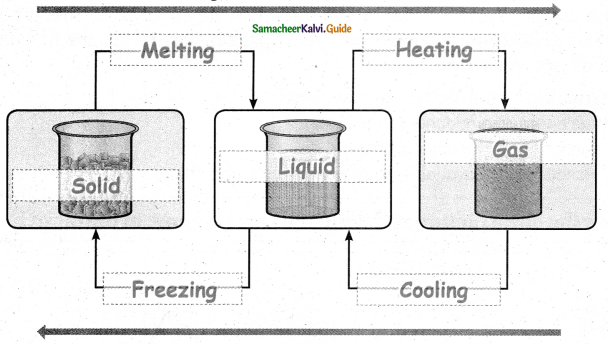
Question 2.
Write any two water bodies in your area
Answer:
River, lake
![]()
Try to Answer (Text Book page No. 71)
Question 1.
Why water is a good example for all states of matter?
Answer:
Water is unique because it is the only natural substance that can exist in all three states of matter at the temperatures normally found on Earth! Water is usually a liquid, but when it reaches to 0° C (32° Fahrenheit (F)), it freezes into ice. (Ice is the solid state of water.) When water reaches 100° C (212° F), it boils.
When it begins to boil, some of the water turns into steam. (Steam is the gas state of water, and is also called water vapour.) When steam comes into contact with cool air (which reduces energy), it can condense back into water droplets (liquid again). Those water droplets could then freeze into (solid) ice.
Question 2.
Which of the following is in liquid state? Rain/Ice/Snow
Answer:
Rain.
![]()
Let us do (Text Book page No. 71)
Question 1.
Fill water in an ice tray and keep it in the freezer. After few hours, take it out. What happened to the water?
Answer:
Water turns into Ice (Solid state).
Question 2.
Now keep this ice tray on a table for some time. What happens to the ice?
Answer:
Ice melts and turns into liquid.
Question 3.
Pour water from the ice tray into a kettle. Ask an elder at your home to heat the kettle and observe the mouth of the kettle when the water starts boiling. What do you see?
Answer:
I see the water turns into vapour and bubbles are formed.
![]()
Think and Answer (Text Book page No. 72)
Question 1.
What happens to the water in a wet cloth?
Answer:
The water, in a wet cloth, gets evaporated. The cloth will be dried up.
![]()
Try to Answer (Text Book page No. 72)
Choose the correct answer.
Question 1.
In the water cycle ____________.
(a) Only evaporation is involved
(b) Only condensation is involved
(c) Evaporation and condensation are involved
Answer:
(c) Evaporation and condensation are involved
![]()
Try to Answer (Text Book page No. 72)
Question 1.
Unscramble the words and fill in the blanks.
(a) ondencsaonti
Answer:
Condensation
(b) vaeionorpat
Answer:
evaporation
c) ecippitatrino
Answer:
(c) precipitation
Question 2.
Is water cycle important for farming? ____________
Answer:
Yes
Question 3.
Why is water cycle important to human? ________________
Answer:
The water cycle is constantly recycling the Earth’s supply of water. As humans need water to service, Water cycle is important.
Question 4.
Name the process which is responsible for the formation of droplets on the surface of a glass of cold drink. _______
Answer:
Condensation
![]()
Try to Answer (Text Book page No. 74)
Question 1.
List out some other benefits of rain water harvesting.
Answer:
- It reduces flooding and erosion.
- It can be used for non-drinking purposes, liking bathing, washing clothes, etc.
- It can improve plant Growth.
Question 2.
Suggest some ideas to save rainwater in your school.
Answer:
- Create awareness about the benefits of Rainwater Harvesting.
- Collect excess water by placing huge plastic drums.
- Install aerators on taps. Aerators reduce the amount of water flowing from the tap by upto 50%.
- Install rainwater tanks. Then connect the tanks to toilets or to the garden.
![]()
Let us do (Text Book page No. 74)
Question 1.
Discuss with your friends.
Rain water harvesting has an important role to protect our environment.
Answer:
Importance of Rainwater Harvesting :
Rainwater harvesting can be a permanent solution to the problem of the water crisis. This is particularly applicable in hilly areas where rainwater harvesting can be utilized for human consumption, for animals and also for farming.
A bad monsoon means low crop yield and shortage of food.
Even animals suffer from a scarcity of water. We face acute water crisis during the summer months. The farmers are the most affected because they do not get sufficient water for their fields. Rainwater harvesting, therefore, is an ideal solution for farmers who depend on monsoon for consistent water supply.
Unavailability of clean water compels the consumption of polluted water, giving rise to water-borne diseases and a high rate of infant mortality.
If rainwater, which comes for free, can be collected and stored, instead of letting it run off, it could be an alternative to back up the main water supply especially during dry spells.
Its importance will not be limited to an individual family but can be used by a community as well. It also creates a sense of social responsibility and awareness about the environment.
The importance of rainwater harvesting lies in the fact that it can be stored for future use. Harvesting rainwater checks surface runoff of water and reduce soil erosion.
In areas having sparse and irregular rainfall, scarcity of water is a persistent problem. It cannot be completely resolved but can be mitigated through rainwater harvesting.
Samacheer Kalvi 4th Science Guide Water Additional Questions and Answers
![]()
I. Choose the best answer :
Question 1.
Ice is in form of ____________.
(a) Gas
(b) Liquid
(c) Solid
(d) Vapour
Answer:
(c) Solid
Question 2.
____________ of our brain’s mass consists of water
(a) 43%
(b) 53%
(c) 63%
(d) 73%
Answer:
(d) 73%
Question 3.
The Antartic region has about ___________ of the worlds fresh water.
(a) 70%
(b) 60%
(c) 50%
(d) 40%
Answer:
(a) 70%
Question 4.
__________ is the chemical formula of water.
(a) H2O
(b) HO
(c) H3O2
(d) O2.
Answer:
(a) H2O
![]()
II. Fill in the blanks with suitable answer :
Question 1.
Human body consists of _____________ of water. Water( 65% / 75%)
Answer:
75%
Question 2.
_____________ is the only way to conserve rain water. (Condensation/Rainwater harvesting)
Answer:
Rain water harvesting
Question 3.
Each day, we lose a little more than a cup of water when we exhale.(inhale/ exhale)
Answer:
Exhale
![]()
III. Write True or False :
Question 1.
The rainwater harvesting was launched by the Tamil Nadu government in 2011.
Answer:
False
Question 2.
1 inch of rainfall on a 2000 sq.ft. roof is equal to 4,800 litres of water.
Answer:
True
![]()
IV. Answer the following questions in one or two sentences :
Question 1.
Where is water available in the liquid state?
Answer:
Water in liquid state is available in water bodies such as oceans, river, waterfalls etc.
Question 2.
How will you get water vapour from water?
Answer:
Water becomes water vapour as the temperature increases due to heat. Heating forms a white mist of extremely small water droplets in the air known as water vapour.

![]()
V. Answer in detail :
Question 1.
How will you construct a rainwater harvesting pit?
Answer:
Tips to construct a rainwater harvesting pit at school/home. Construct a pit of any shape or size. It may be generally constructed, 1-2 metre wide and 2-3 metre depth. The pits can be filled with boulders, gravels and Coarse sand. Put the boulders in the bottom, sand in the top and gravels in the middle.